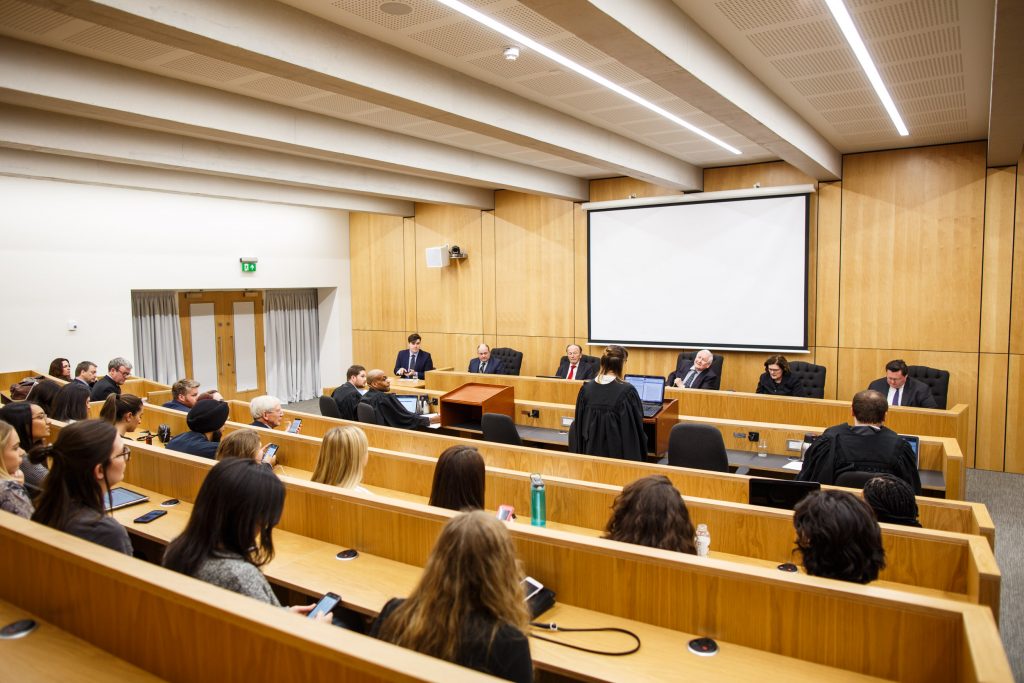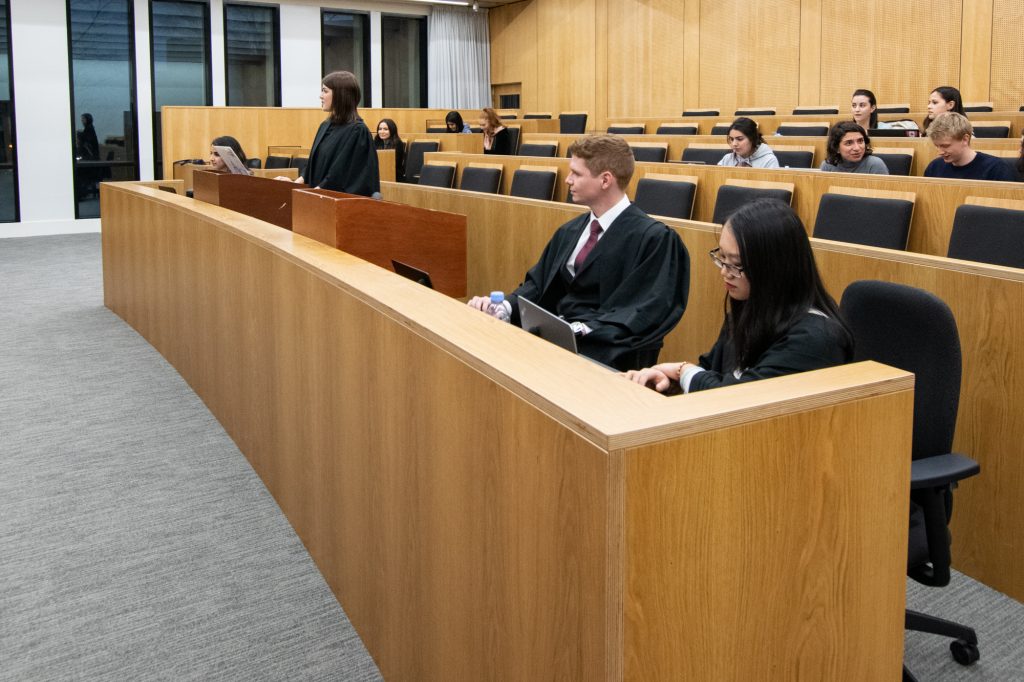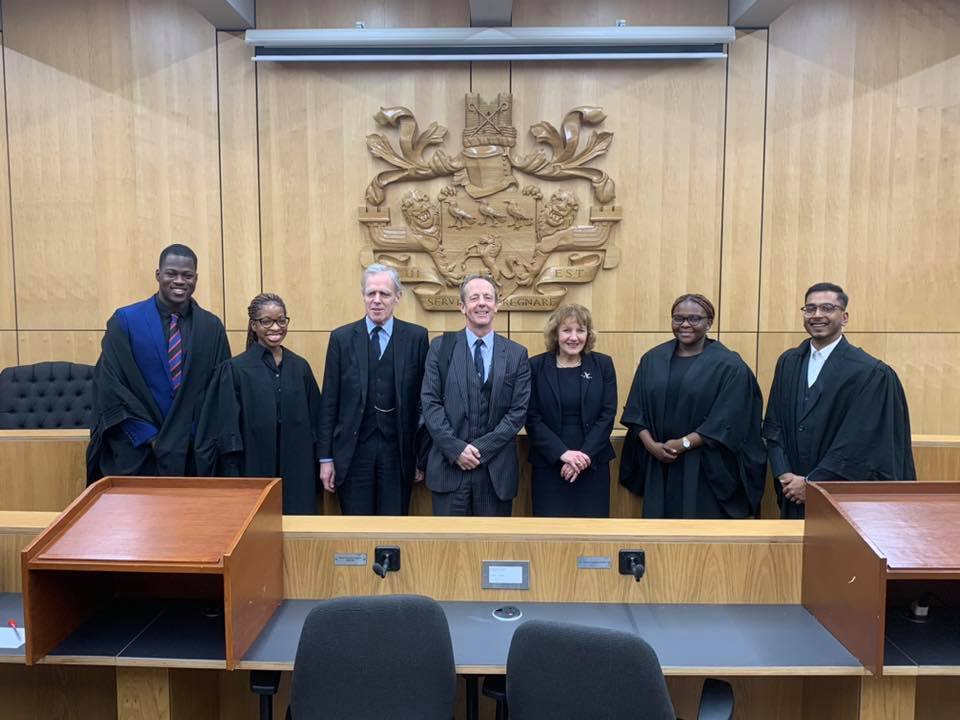A “moot” is a pretend, simulated oral court hearing where students get to argue over points of law.
- Back in the late Middle Ages, mooting was the primary teaching tool for aspiring barristers (so it’s arguably the oldest form of legal education)
- Today, mooting is still a great way of learning about law: it enhances legal knowledge and analysis; advocacy and research skills; oral and written presentation skills; teamwork and time-keeping
- Aspiring barristers are expected to provide evidence of mooting on an application form or CV
- Similarly if you want to be a solicitor, advocacy is now a key part of the job.
- Moots can cover all areas of law. The most popular areas are Criminal, Contract, Tort, Land and Public Law
- Kent’s busy programme of mooting is supported by academic staff, practising lawyers, members of the judiciary and alumni
- Moots at Kent take place in the Kennedy Wong Moot Court (a state-of-the-art replica courtroom on the top floor of the Wigoder Law Building)
- The current Director of Mooting is Darren Weir, previously a practising barrister for many years.
Mooting at Kent Law School
- As a student at Kent Law School, you can choose to study a module that give you practical experience of Mooting
- The LW638 Mooting Module introduces you to the skills you need to resolve legal disputes in the context of appellate litigation (ie representing your client before an appeals court)
- The module is non-contributory ie assessment does not formally ‘count’ towards your degree classification
What’s involved?
- You’ll be introduced to the practice of mooting and the skills required to prepare for it
- You’ll learn:
- how to research the area of law involved in the moot problem
- how to draft a ‘Skeleton Argument’
- how to present your moot – the Director of Mooting and the Chief Clerk (a student with previous experience of mooting), will help you prepare by going through your argument
- how to make oral submissions to an “appellate court” (commonly called an appeals court)
- how to use the Digital Case Management System (provided by Caselines)
The Mooting programme at Kent is separated into different levels:
- Beginners Mooting
- Intermediate Mooting
- Advanced Mooting
- Mentor Mooting
Beginners Mooting (Speed Mooting)
- This is a beginners’ mooting competition and acts as an introduction to the rest of the programme
- Available to Stage 1 students in particular and to anyone else who has not yet mooted
- You receive a moot problem, skeleton arguments and legal authorities a couple of days before the moot takes place
- You then compete in a single person competition against a fellow student on a knock-out basis
- You’ll be arguing a single point of law and will have seven minutes to present your submissions.
- This competition tests your oral skills of advocacy and is a great way to build confidence before attempting the other mooting programmes
- You can apply to take part in Speed Mooting at the start of the Autumn and Spring terms
Intermediate Mooting (LW638)
- You apply to participate in a moot with a partner and then, following induction, will be assigned a moot problem
- Moots at this level are judged by academics and/or practitioners who will sit with student judges from the Mentor Mooting team
- You can apply as a pair during online Moodle registration for co-curricular activities (no prior mooting experience is required)
- After you successfully complete this module, mooting appears on your degree transcript (though it remains noncontributory to the overall degree)
- Skills that you gain include detailed knowledge and understanding of:
- the general and ethical principles underlying successful advocacy
- the preparatory work required for successful advocacy and its purpose eg the production of skeleton arguments
- the law, practice, techniques and etiquette of advocacy
Advanced Mooting (LW638)
- The same as for Intermediate Mooting (above) but ideally, you should have mooted before (though this does not preclude you from applying)
Mentor Mooting
- This programme is for students who have already passed through the Intermediate or Advanced Mooting programmes and who have demonstrated a high level of attainment in mooting
- As a member of the Mentor Mooting team, you play a key role in the mentoring and judging of intermediate students
- You are the first to be invited to represent the University at external competitions
- You may also be asked to assist the Chief Clerk with administrative responsibilities.
Enhance your employability
Mooting is part of a wide range of practical skills and experiential learning that you can choose to study at Kent Law Schools, all of which serve to enhance your employability and prepare you for a successful career. Other practical skills modules include Negotiation, Mediation, Client Interviewing and Mock Trial Advocacy. These co-curricular activities give you the opportunity to build your confidence and to learn “by doing”.
And it’s an excellent way for you to apply what you learn in the class room – the simulated scenarios that you’re given help develop your research, writing and oral presentation skills.
Whether or not you want to enter the legal profession, these modules equip you with the ability to think, to solve problems and to come up with creative solutions to issues that seem intractable. And that’s ultimately what employers want graduates to do! We hope you’ll take the opportunity to take one, if not more, of these co-curricular activities during your degree at Kent Law School.
Mooting success stories at Kent
- Aspiring barristers at Kent scoop prestigious awards
- Gintare wins the final of the Boys and Maughan Civil Advocacy Competition
- KLS mooting goes to the Supreme Court in London!
- Kent is first university in England and Wales to hold paperless moot
- Law student Matthew Thomson wins final of Civil Advocacy Competition
- Mooting experiences help Kent law student secure more than £20k in scholarships
- Kent students win prestigious UK Canadian Law mooting competition
- Law students reflect on skills gained through international mooting
- Canadian Law students compete in final of national mooting competition
- Law student wins Spirit of LAWASIA Team Award at international moot in Cambodia
- Law student Ebun Adeniran wins final of Civil Advocacy Competition



